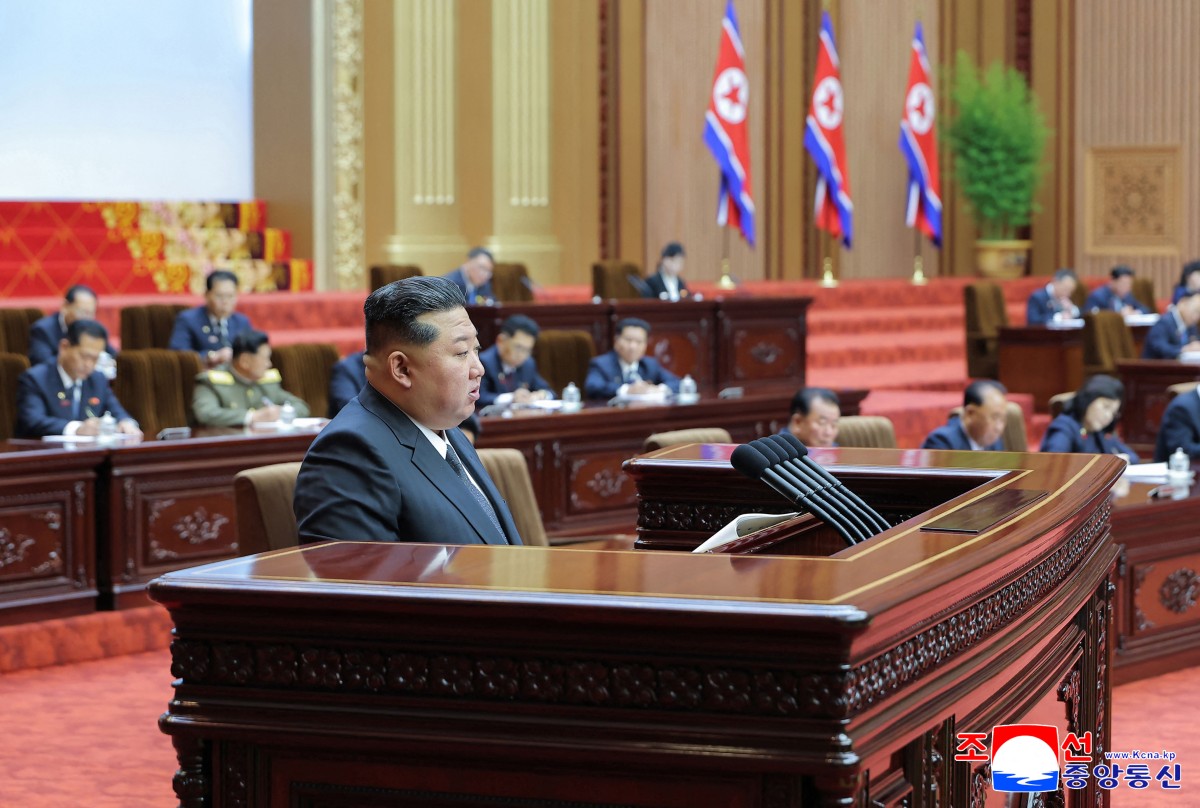September 23, 2025
SEOUL – North Korean leader Kim Jong-un signaled openness to meeting with US President Donald Trump if Washington drops its pursuit of denuclearization — a pointed message delivered around a month before Trump is set to attend the APEC summit in South Korea.
Kim’s outline of conditions for resuming dialogue with Trump marked his first direct reference to their personal rapport since the beginning of Trump’s second term. It was a rare break from Pyongyang’s practice of avoiding direct mention of Trump’s name since the abrupt collapse of their February 2019 summit in Hanoi.
In stark contrast, Kim struck a much harsher tone toward Seoul ahead of President Lee Jae Myung’s speech at the UN General Assembly on Tuesday, where Lee is expected to outline his vision for the Korean Peninsula, including a call for a nuclear-free peninsula.
Kim declared there would be “no occasion to sit face-to-face” with South Korea in a policy speech Sunday before the Supreme People’s Assembly, the North’s rubber-stamp parliament, according to state media reports Monday.
“If the US wishes for genuine peaceful coexistence with us on the basis of abandoning its delusional fixation on denuclearization and acknowledging reality, then we have no reason not to stand face-to-face with the US,” Kim said in his Korean-language speech.
“I still, personally, have good memories of the current US President Trump.”
Kim, however, clarified that denuclearization is off the table: “I state unequivocally that there can never, under any circumstances, be such a thing as ‘denuclearization’ on our part.”
Kim explained that the country’s “status as nuclear weapons possession has been written into the DPRK’s highest law as something sacred and absolute, which can neither be harmed nor altered under any circumstances.” The DPRK is short for North Korea’s official name, the Democratic People’s Republic of Korea.
“To now call for ‘denuclearization’ is to ask us to commit an unconstitutional act,” Kim said.
In September 2023, the SPA adopted a constitutional amendment formally enshrining the policy of strengthening the country’s nuclear forces.
Kim also dismissed President Lee’s three-stage denuclearization plan — which calls for Pyongyang to freeze, reduce and eventually dismantle its nuclear weapons program — as “nothing more than a copy-and-paste version from the homework notebooks of his predecessors who dreamed of disarming us.”
In his speech, Kim flatly dismissed any prospect of inter-Korean dialogue and reconciliation.
“We will have no occasion to sit face-to-face with South Korea and will do nothing together with them. I make it clear that we will not deal with them in any way,” Kim said.
“The stark reality is that the two most hostile states — two belligerents still at war — have been locked in acute confrontation on the Korean Peninsula,” Kim added.
Kim declared that “unification is unnecessary,” stressing that unification “cannot be achieved unless one ceases to exist.”
Analysts said Kim’s speech appeared designed to put Trump back at the center of Pyongyang’s diplomatic calculus and to frame the agenda ahead of the APEC summit, to be held Oct. 31 to Nov. 1 in Gyeongju, North Gyeongsang Province.
“Kim Jong-un’s message to the US is aimed at singling out Trump as a specific target in North Korea’s diplomatic strategy to induce a shift in the US’ North Korea policy,” said Lim Eul-chul, a professor at Kyungnam University’s Institute for Far Eastern Studies in Seoul.
Kim’s reference to having “good memories” of Trump appears to leave the door open to dialogue, but his outright rejection of denuclearization and strict preconditions for “peaceful coexistence” have actually upped the ante for the resumption of a Trump-Kim summit.
“It signals that talks would only be possible if the US makes the first concession, effectively raising the bar for negotiations and reinforcing the message that North Korea’s nuclear status is a fait accompli,” Lim explained.
Yang Moo-jin, an honorary professor at the University of North Korean Studies in Seoul, noted that Kim’s speech came at a critically sensitive moment.
Yang pointed to “the strengthening of the North Korea-China-Russia alignment, the 80th anniversary of the Workers’ Party’s founding, efforts to consolidate the regime ahead of the Ninth Party Congress, and the inauguration of South Korea’s new administration” as the context that made the timing of the speech particularly significant.
“It also carried the character of a preemptive counter to President Lee Jae Myung’s keynote address at the UN General Assembly,” Yang added.
dagyumji@heraldcorp.com
